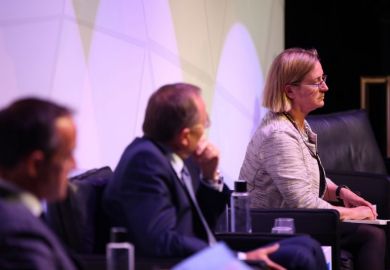At the height of the Cold War, Robert Rathbun Wilson, founding director of Fermilab, the US high-energy particle physics facility just outside Chicago, was called to testify in front of a congressional committee, which sought clarity over his requirement for the $250 million investment.
What, the senators wanted to know, was the contribution of a particle accelerator to securing the nation’s defence?
“It has nothing to do directly with defending our country,” advised Wilson, “except to make it worth defending.”
In our time, marked by all manner of concerns regarding the applicability of education and research to society, such enlightened outlooks are worth repeating. Science and technology, while transforming the world, are also products of it. They are not neutral but invariably bear the imprint of the period they are born into: whether this be through the adoption of deterministic metaphors such as viruses and meltdowns, or simply the vision and ambition – or lack of these – of the cultural context they develop within.
When Steve Jobs – the co-founder of Apple – passed away six years ago, I recall one obituary noting his genius at capturing the zeitgeist of our increasingly atomised and introspective age. His gadgets allowed people to update their status to their legions of largely unknown, virtual friends, as well as to reveal their most immediate and inane thoughts to the entire world.
How much more he could have been, the writer proffered, had he lived in a time of somewhat greater social and technological ambition.
We forget, too, how quickly our views of the world have changed. Climate change was not perceived of as a problem until recently. And that emerged in a period of political instability – the 1960s – accelerating in the context of the economic slowdown and energy crises of the 1970s. The notion that change may be abrupt is even more recent. But, when paradigms shift so rapidly, from stability at one point to fragility at the next, then maybe they are driven more by changes in society than changes in nature?
The passing of the old, Cold War, world order led to a growing sense of insecurity and instability that reflected the breakdown of the old certainties. There emerged a new focus on risk with a concomitant profusion of advice and warnings from countless agencies.
Safety and precaution became an integral part of our cultural landscape. But this led to public disengagement, too, as people do not act on the basis of evidence alone, but rather through their values and beliefs, which science does not shape.
Once risk mitigation becomes prioritised over innovation, it readily becomes a ritual. When BP’s Deepwater Horizon platform exploded in the Gulf of Mexico in 2010 (pictured), it transpired that its risk-management manual – aside from discussing the protection of walruses and sea lions, of which there are none there – included 40 pages on how to manage the media in an emergency, but just nine on dealing with an actual oil spill.
Image and reputation have now come to matter more than actual insights and results.
The internet of things – whereby all our devices may one day become interconnected – has increasingly been overrun by those apparently more interested in the “internet” part of that phrase than in the “things” element. So, as the internet becomes ever more sophisticated, it is increasingly connecting rather ageing things. Some advocates appear more interested in getting more out of existing assets – such as with sensors for just-in-time maintenance – than in examining the possibilities of building anew.
But, again and again, ageing infrastructure lets us down. Those affected by the WannaCry ransomware attack earlier this year were running outmoded software. And maybe those who ignored – or simply missed – the warnings were too busy handling the latest government-instigated reorganisation and dealing with cuts. Similarly, the primary reason for anyone to face a power outage today is not terrorism, but opposition to installing cables and pylons, as well as delays over introducing new power plants.
The social and cultural dimensions are central to science and technology. Our outlooks and presumptions can liberate us or hold us back. Shaping these has never been more vital as people who believe in a cause or project are far more effective agents of it than those who are coerced or corralled. But to benefit from this power of conviction, there needs to be a concomitant intellectual or ideological engagement that is often absent today. Obstructing those we oppose is not the same as articulating what we are for.
The biggest threat we face today may be a cultural disconnect within our midst. While the authorities worry about terrorism, pandemics and climate change, the public dwell on the economy, healthcare and their children’s access to a good education. That sudden shocks concern our leaders most speaks volumes of the challenges we face. Slow and steady drift can be just as destabilising. Whatever our views on Brexit or Donald Trump may be, we cannot dismiss those who experience and think differently from us.
A hundred years on from the Russian revolution, it may be worth citing that most infamous revolutionary of all – Leon Trotsky – who pointed out that such events derive not from the flexibility of our minds “but just the opposite, from its deep conservatism”. What security science and technology need is not so much an internet of things as “engagement with people”. It also behoves social science to engage more with science, as well as people, and to transcend the dystopian mindset of the past half-century.
Bill Durodié is chair of international relations in the department of politics, languages and international studies at the University of Bath.
On Wednesday 15 November 2017, he will deliver the Vincent Briscoe Security Lecture at Imperial College London, titled “Big Data needs Big Ideas: engaging social science for effective security science and technology”. You can watch the lecture from 17:30 (GMT) on this link.
Register to continue
Why register?
- Registration is free and only takes a moment
- Once registered, you can read 3 articles a month
- Sign up for our newsletter
Subscribe
Or subscribe for unlimited access to:
- Unlimited access to news, views, insights & reviews
- Digital editions
- Digital access to THE’s university and college rankings analysis
Already registered or a current subscriber?







